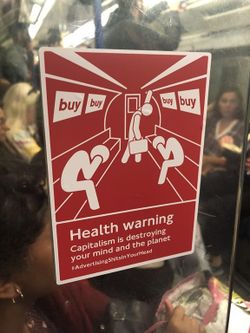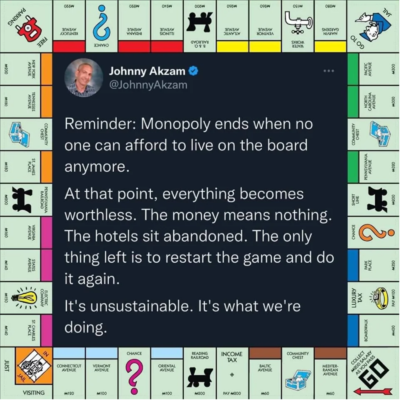Difference between revisions of "Capitalism"
m (tamplte) |
m (dsc) |
||
| (One intermediate revision by the same user not shown) | |||
| Line 3: | Line 3: | ||
|image=Capitalism.jpg | |image=Capitalism.jpg | ||
|image_caption=A [[subvertisement]] illustrating the influence of [[advertising]] on urban workers. | |image_caption=A [[subvertisement]] illustrating the influence of [[advertising]] on urban workers. | ||
| − | |constitutes= | + | |constitutes=Concept |
| + | |description=An economical system started before the industrial revolution in the [[1700s]]. | ||
}} | }} | ||
"'''Capitalism''' is a system that rewards privatisation of gain and socialisation of cost, and then gives the winners the wealth to buy political power to entrench the system. A recipe for omnicide": [https://twitter.com/AjculeyJohn Adrian John Culey] on ''[[Twitter]]''.<ref>''[https://twitter.com/AjculeyJohn/status/1223898312081698816 "Capitalism is a recipe for omnicide"]''</ref> | "'''Capitalism''' is a system that rewards privatisation of gain and socialisation of cost, and then gives the winners the wealth to buy political power to entrench the system. A recipe for omnicide": [https://twitter.com/AjculeyJohn Adrian John Culey] on ''[[Twitter]]''.<ref>''[https://twitter.com/AjculeyJohn/status/1223898312081698816 "Capitalism is a recipe for omnicide"]''</ref> | ||
==Unpopularity== | ==Unpopularity== | ||
| + | [[File:Monopoly reveals capitalism.png|400px|thumb|left]] | ||
A 2018 [[Gallup]] poll found that only 45% of younger US citizens were positive about capitalism.<ref>''[https://news.gallup.com/poll/240725/democrats-positive-socialism-capitalism.aspx "Democrats More Positive About Socialism Than Capitalism"]''</ref> | A 2018 [[Gallup]] poll found that only 45% of younger US citizens were positive about capitalism.<ref>''[https://news.gallup.com/poll/240725/democrats-positive-socialism-capitalism.aspx "Democrats More Positive About Socialism Than Capitalism"]''</ref> | ||
A 2016 study by Stanford researchers found that those entering the workforce today "are far less likely to earn more than their parents when compared to children born two generations before them."<ref>''[https://www.cnbc.com/2018/08/14/fewer-than-half-of-young-americans-are-positive-about-capitalism.html "Most young Americans prefer socialism to capitalism, new report finds"]''</ref> | A 2016 study by Stanford researchers found that those entering the workforce today "are far less likely to earn more than their parents when compared to children born two generations before them."<ref>''[https://www.cnbc.com/2018/08/14/fewer-than-half-of-young-americans-are-positive-about-capitalism.html "Most young Americans prefer socialism to capitalism, new report finds"]''</ref> | ||
{{SMWDocs}} | {{SMWDocs}} | ||
| − | |||
| − | |||
| − | |||
| − | |||
| − | |||
| − | |||
| − | |||
| − | |||
| − | |||
| − | |||
| − | |||
==References== | ==References== | ||
{{reflist}} | {{reflist}} | ||
Latest revision as of 12:14, 16 December 2023
(Concept) | |
|---|---|
 A subvertisement illustrating the influence of advertising on urban workers. | |
| Interest of | • Bilderberg/2019 • T. J. Coles • Ralph Schoenman • Andrew Shonfield • Wolfgang Streeck |
| An economical system started before the industrial revolution in the 1700s. | |
"Capitalism is a system that rewards privatisation of gain and socialisation of cost, and then gives the winners the wealth to buy political power to entrench the system. A recipe for omnicide": Adrian John Culey on Twitter.[1]
Unpopularity
A 2018 Gallup poll found that only 45% of younger US citizens were positive about capitalism.[2]
A 2016 study by Stanford researchers found that those entering the workforce today "are far less likely to earn more than their parents when compared to children born two generations before them."[3]
Examples
| Page name | Description |
|---|---|
| Asset stripping | A tactic used to centralise control and power. |
| Business |
Related Quotations
| Page | Quote | Author | Date |
|---|---|---|---|
| 2020 | “As the Establishment feels its grip slipping, as people wake up to the appalling economic exploitation by the few that underlies the very foundations of modern western society, expect the methods used by the security services to become even dirtier. You can bank on continued ramping up of Russophobia to supply “the enemy”. As both Scottish Independence and Jeremy Corbyn are viewed as real threats by the British Establishment, you can anticipate every possible kind of dirty trick in the next couple of years, with increasing frequency and audacity.” | Craig Murray | December 2018 |
| Philip Agee | “Reforms of the FBI and the CIA, even removal of the President from office, cannot remove the problem. American capitalism, based as it is on exploitation of the poor, with its fundamental motivation in personal greed, simply cannot survive without force – without a secret police force. The argument is with capitalism and it is capitalism that must be opposed, with its CIA, FBI and other security agencies understood as logical, necessary manifestations of a ruling class’s determination to retain power and privilege.” | Philip Agee | 1975 |
| Jacques Attali | “The real bourgeoisie running the world is about 1,000 people. They are running capitalism." He reconsiders: "Well, one might say it's 10,000, but no more than that. In a world population of 6.5 billion, that is not very many people” | Jacques Attali | 2006 |
| Warren Buffett | “There's class warfare, all right, but it's my class, the rich class, that's making war, and we're winning.” | Warren Buffett | 2006 |
| Al Capone | “This American system of ours ... call it Americanism, call it capitalism, call it what you like, gives to each and every one of us a great opportunity if we only seize it with both hands and make the most of it.” | Al Capone | 1930 |
| George Carlin | “You might have noticed that I never complain about politicians. I leave that to others. And there's no shortage of volunteers; everyone complains about politicians. Everyone says they suck. But where do people think these politicians come from? They don't fall out of the sky; they don't pass through a membrane from a separate reality. They come from American homes, American families, American schools, American churches, and American businesses. And they're elected by American voters. This is what our system produces, folks. This is the best we can do. Let's face it, we have very little to work with. Garbage in, garbage out. So maybe it's not the politicians who suck; maybe it's something else. Like the public. That would be a nice realistic campaign slogan for somebody: "The public sucks. Fuck hope." Put the blame where it belongs: on the people. Because if everything is really the fault of politicians, where are all the bright, honest, intelligent Americans who are ready to step in and replace them? Where are these people hiding? The truth is, we don't have people like that. Everyone's at the mall, scratching his balls and buying sneakers with lights in them. And complaining about the politicians.” | George Carlin | |
| Eugene Debs | “Getting a living under capitalism... is so precarious, so uncertain, fraught with such pain and struggle that the wonder is not that so many people become vicious and criminal, but that so many remain in docile submission to such a tyrannous and debasing condition.” | Eugene Debs | |
| Karl Marx | “So long as things go well, competition effects an operating fraternity of the capitalist class, as we have seen in the case of the equalisation of the general rate of profit, so that each shares in the common loot in proportion to the size of his respective investment. But as soon as it no longer is a question of sharing profits, but of sharing losses, everyone tries to reduce his own share to a minimum and to shove it off upon another. The class, as such, must inevitably lose. How much the individual capitalist must bear of the loss, i.e., to what extent he must share in it at all, is decided by strength and cunning, and competition then becomes a fight among hostile brothers. The antagonism between each individual capitalist's interests and those of the capitalist class as a whole, then comes to the surface, just as previously the identity of these interests operated in practice through competition.” | Karl Marx | |
| Michael Parenti | “Every ruling class has wanted only this: all the rewards and none of the burdens. The operational code is: we have a lot; we can get more; we want it all.” | Michael Parenti | |
| SSRI | “When we stop at the pharmacy to pick up our Prozac®, are we simply buying a drug? Or are we buying into a disease as well? The first complete account of the phenomenon of antidepressants, this authoritative, highly readable book relates how depression, a disease only recently deemed too rare to merit study, has become one of the most common disorders of our day—and a booming business to boot.
The Antidepressant Era chronicles the history of psychopharmacology from its inception with the discovery of chlorpromazine in 1951 to current battles over whether these powerful chemical compounds should replace psychotherapy. An expert in both the history and the science of neurochemistry and psychopharmacology, David Healy offers a close-up perspective on early research and clinical trials, the stumbling and successes that have made Prozac® and Zoloft® household names. The complex story he tells, against a backdrop of changing ideas about medicine, details the origins of the pharmaceutical industry, the pressures for regulation of drug companies, and the emergence of the idea of a depressive disease. This historical and neurochemical analysis leads to a clear look at what antidepressants reveal about both the workings of the brain and the sociology of drug marketing. Most arresting is Healy’s insight into the marketing of antidepressants and the medicalization of the neuroses. Demonstrating that pharmaceutical companies are as much in the business of selling psychiatric diagnoses as of selling psychotropic drugs, he raises disturbing questions about how much of medical science is governed by financial interest.” | David Healy | 1999 |
| Yanis Varoufakis | “The problem with capitalism is not that it is unfair but that it is irrational, as it habitually condemns whole generations to deprivation and unemployment and even turns capitalists into angst-ridden automata, living in permanent fear that unless they commodify their fellow humans fully so as to serve capital accumulation more efficiently, they will cease to be capitalists. So, if capitalism appears unjust this is because it enslaves everyone; it wastes human and natural resources; the same production line that pumps out remarkable gizmos and untold wealth, also produces deep unhappiness and crises.” | Yanis Varoufakis | 18 February 2015 |
Related Documents
| Title | Type | Publication date | Author(s) | Description |
|---|---|---|---|---|
| Document:Brexit reveals Corbyn to be the true moderate | blog post | 12 September 2019 | Jonathan Cook | It is time to stop acting like zealots for neoliberalism, squabbling over which brand of turbo-charged capitalism we prefer, and face up to our collective responsibility to change our and our children’s future. |
| Document:Capitalism normalizes death: From COVID-19 to the threat of nuclear war | Article | Andre Damon | The total devaluation of human life, the indifference to mass death in the pandemic and the recklessness with which American capitalism is rushing into conflict with Russia, reflect the views and social character of the American ruling class. This parasitic oligarchy feasts upon the impoverishment and exploitation of the working population. | |
| Document:The tyranny of woke capitalism | Article | 25 June 2021 | Frank Furedi | What is "woke capitalism"? It is a form of corporate virtue signalling. |
